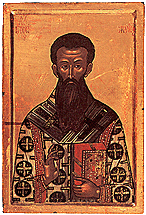 |
|
 |
The hesychast conflict
 n this sprit,
Barlaam
strove to refute many of
n this sprit,
Barlaam
strove to refute many of
 the beliefs of hesychasm - those in particular that refused to accept the independence of the mind in relation to religion and to allow that man is a being who can grow and develop through knowledge without the intervention of God. He began his campaign in Thessalonike in 1340, using in favour of his views arguments and propositions supported by personalities of the Church. He found similarities in the works of
pseudo-Dionysios Aeropagites
and in other writings of
neoplatonic philosophers, and he
claimed that the ancient philosophers had been enlightened by God, since they had realised that God was unapproachable. Hence, there was no significant difference between the followers of the Church and Christianity and those who were enlightened by God without being Christians, a view which, as we have seen, was supported by the hesychasts. Furthermore, the idea of God as inaccessible was consistent in Barlaam's mind with the theory of knowledge expressed by Aristotle, that is, that our senses, and everything that we perceive with their help, are the only "tools" that can lead us to a measure of knowledge. Therefore, since God is an incorporeal spirit and our senses do not perceive him, there can be no knowledge nor experience of God, as the hesychasts maintained. the beliefs of hesychasm - those in particular that refused to accept the independence of the mind in relation to religion and to allow that man is a being who can grow and develop through knowledge without the intervention of God. He began his campaign in Thessalonike in 1340, using in favour of his views arguments and propositions supported by personalities of the Church. He found similarities in the works of
pseudo-Dionysios Aeropagites
and in other writings of
neoplatonic philosophers, and he
claimed that the ancient philosophers had been enlightened by God, since they had realised that God was unapproachable. Hence, there was no significant difference between the followers of the Church and Christianity and those who were enlightened by God without being Christians, a view which, as we have seen, was supported by the hesychasts. Furthermore, the idea of God as inaccessible was consistent in Barlaam's mind with the theory of knowledge expressed by Aristotle, that is, that our senses, and everything that we perceive with their help, are the only "tools" that can lead us to a measure of knowledge. Therefore, since God is an incorporeal spirit and our senses do not perceive him, there can be no knowledge nor experience of God, as the hesychasts maintained.
This, of course, aroused the anger and opposition of the Church, and was the beginning of the long-lasting hesychast controversy. Standing forth as a champion of the Church was Gregory Palamas, a monk and eminent theologian, who opposed Barlaam and defended the essential position of the traditional Byzantine Church, that is that God may be inaccessible to the human senses, but he is present through his action in the world, and that man is united to God through holy communion. Moreover, he proclaimed his opposition to ancient Greek culture, of which he believed only a few selected features could be adopted and be of service to the Christian religion, while he considered that as a whole it was extremely dangerous for Christians
See also: Gregory Palamas
|